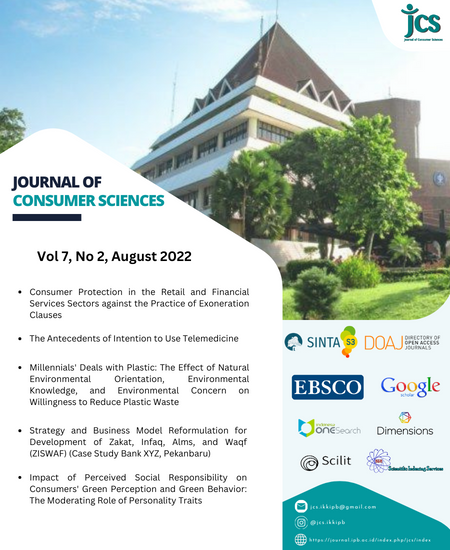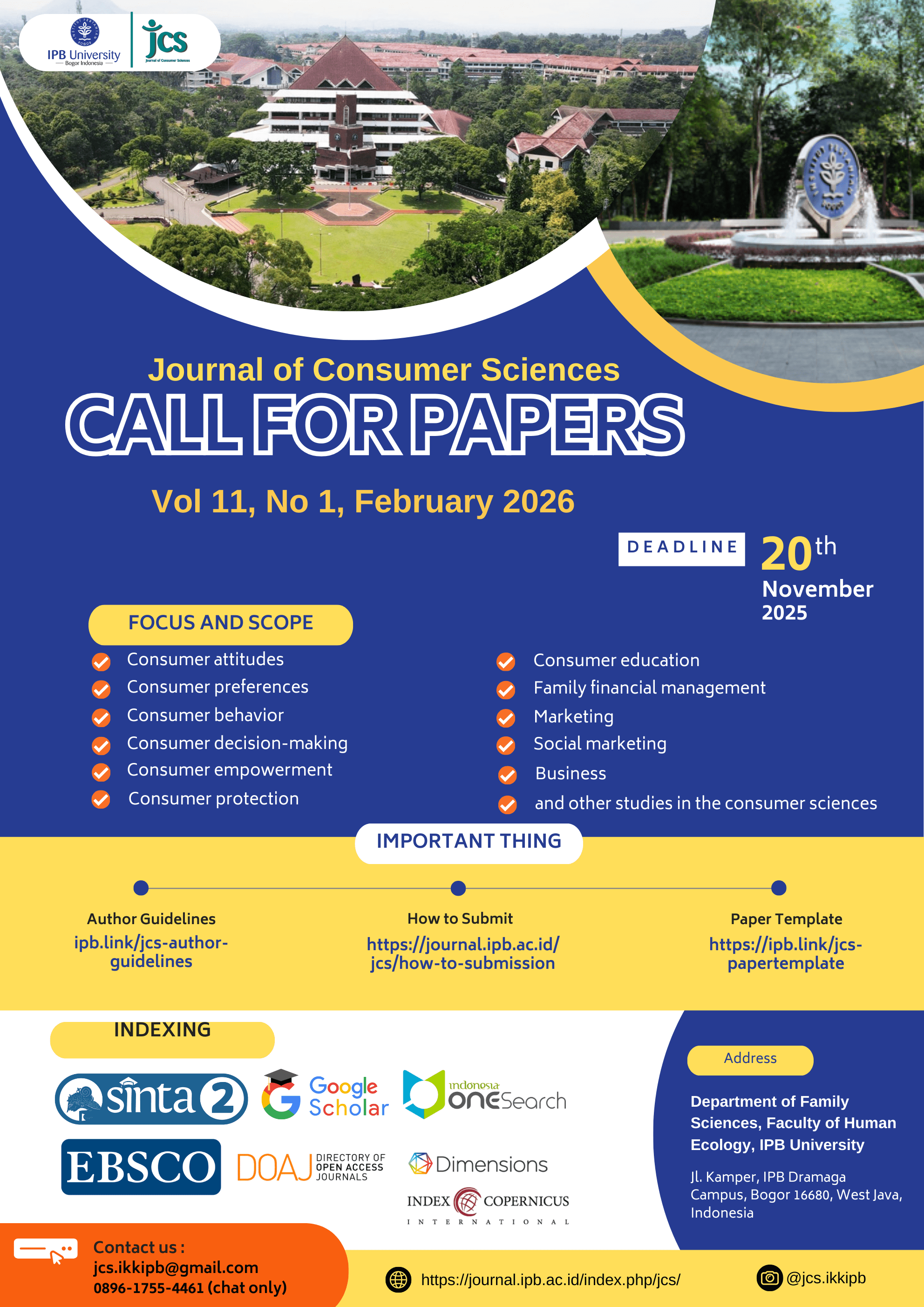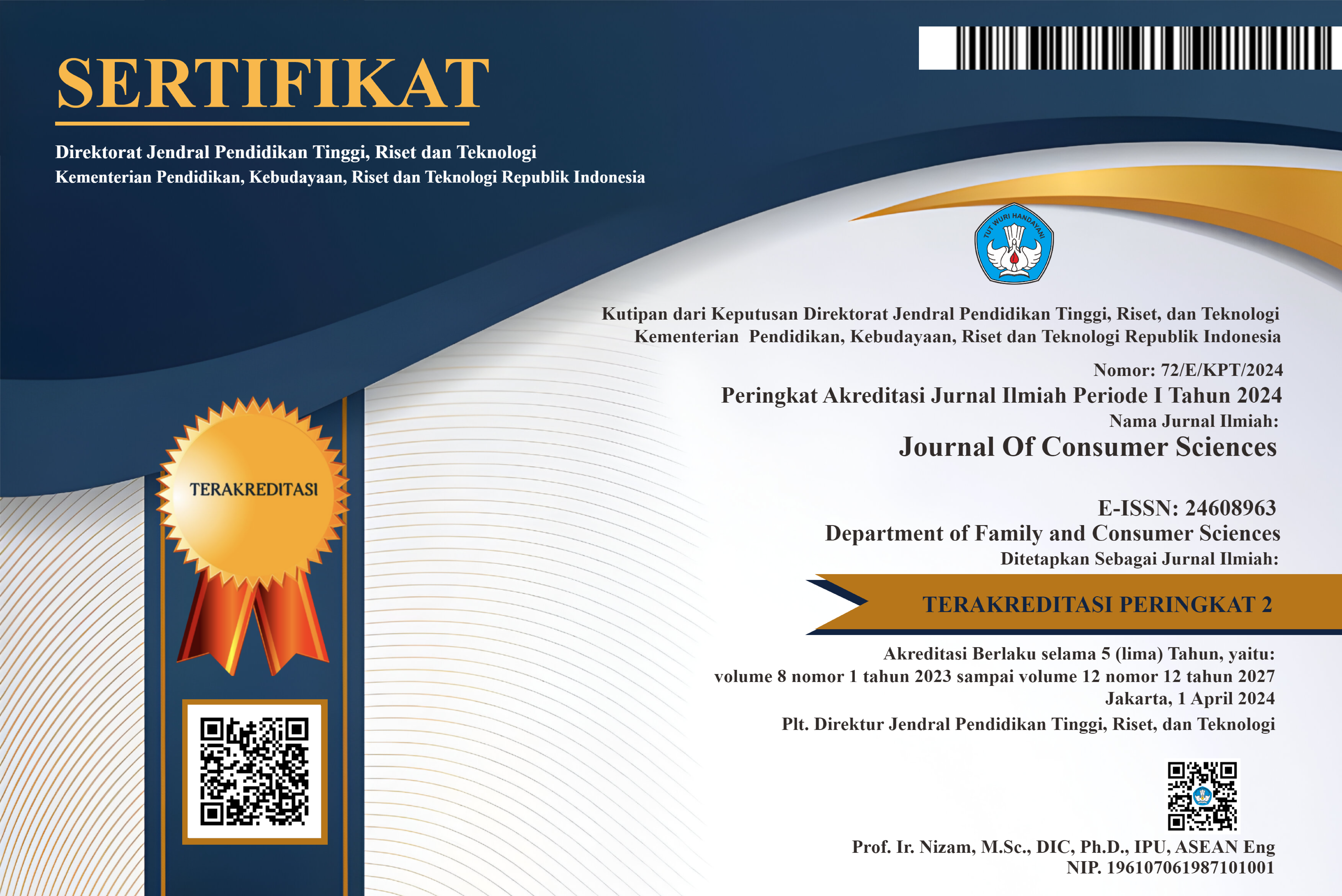Millennials' Deals with Plastic: The Effect of Natural Environmental Orientation, Environmental Knowledge, and Environmental Concern on Willingness to Reduce Plastic Waste
DOI:
https://doi.org/10.29244/jcs.7.2.116-134Keywords:
environmental knowledge, environmental concern, environmental attitude, natural environmental orientation, willingness to reduce plastic wasteAbstract
To maintain environmental sustainability can be managed and resolved by changing human behavior, especially by reducing plastic waste. This study investigated whether natural environmental orientation, environmental knowledge, environmental concern, and environmental attitude affect the extent to which millennials avoid or reduce the purchase of single-use plastic tableware, food with plastic packaging, and plastic water bottles called Willingness to Reduce Plastic Waste (WRPW). This study used quantitative using the purposive sampling method. Data collection techniques using online questionnaires were sent to respondents with criteria for educated millennial Muslims at Islamic universities in East Java, Central Java, and West Java. The survey was conducted for three months and obtained 369 respondents. The questionnaire is processed by using SEM analysis with Smart PLS. The results show that environmental knowledge provides a direct and an indirect effect on willingness to reduce plastic waste through environmental attitude. Meanwhile, environmental concern has no direct effect on willingness to reduce plastic waste, yet it has an indirect effect through environmental attitude. This research implies that concern for the environment is not necessarily accompanied by the willingness to reduce the use of plastic. However, adequate knowledge about the environment can increase the willingness to reduce the use of plastic among millennial generations who prioritize logical thinking and adapt to their knowledge.
References
Ajzen, I. (1999). The theory of planned behavior. Organizational Behavior and Human Decision Processes, 50(2), 179-211. doi: https://doi.org/10.1016/0749-5978(91)90020-T
Bamberg, S., & Möser, G. (2007). Twenty years after Hines, Hungerford, and Tomera: A new meta-analysis of psycho-social determinants of pro-environmental behaviour. Journal of Environmental Psychology, 27, 14–25. doi: https://doi.org/10.1016/j.jenvp.2006.12.002
Baztan, J., Carrasco, A., Chouinard, O., Cleaud, M., Gabaldon, J.E., Huck, T., Jaffres, L., Jorgensen, B., Miguelez, A., Paillard, C., & Vanderlinden, J. P. (2014). Protected areas in the Atlantic facing the hazards of micro-plastic pollution: first diagnosis of three islands in the Canary Current. Marine Pollution Bulletin, 80, 302-311. doi: https://doi.org/10.1016/j.marpolbul.2013.12.052
Blocker, T. J., & Eckberg, D. L. (1997). Gender and environmentalism: results from the 1993 general social survey. Social Science Quarterly, 78(4), 841-858.
Brahim, C., Wafa, S. A., & Wafa, S. K. W. (2016). Examining green consumerism motivational drivers: does premium price and demographics matter to green purchasing. Journal of Cleaner Production, 112(1137), 3436-3450. doi: https://doi.org/10.1016/J.JCLEPRO.2015.09.102
Cavaliere, A., Pigliafreddo, S., De Marchi, E., & Banterle, A. (2020). Do Consumers Really Want to Reduce Plastic Usage? Exploring the Determinants of Plastic Avoidance in Food-Related Consumption Decisions. Sustainability, 12(22), 9627. doi: https://doi.org/10.3390/su12229627
Chan, R. Y., & Lau, L. B. (2000). Antecedents of green purchases: a survey in China. Journal of Consumer Marketing, 17(4), 338-357. doi: 10.1108/07363760010335358
Clayton, S., Bexell, S. M., Xu, P., Tang, Y. F., Li, Wen J., & Chen, L. (2019). Environmental literacy and nature experience in Chengdu, China. Environmental Education Research, 25(7), 1105-1118. doi: https://doi.org/10.1080/13504622.2019.1569207
Coelho, F., Pereira, M. C, Cruz, L., Simões, P., & Barata, E. (2017) Affect and the adoption of pro-environmental behaviours: A structural model. Journal of Environmental Psychology, 54, 127-138. doi: 10.1016/j.jenvp.2017.10.008
Connell, S., Fien, J., Lee, J. Sykes, H., & Yencken, D. (1999). If it doesn't directly affect you, you don't think about it: a qualitative study of young people's environmental attitudes in two Australian cities, Environmental Education Research, 5(1), 95-113. doi: https://doi.org/10.1080/1350462990050106
Culin, J., Bieli´c, T., & Jakši´C.K. (2019). Suggestions for improving the effectiveness of environmental education in the maritime sector. Scientific Journal of Maritime Research 33, 232-237. doi: https://doi.org/10.31217/p.33.2.13
Dursun, I., Tümer Kabadayı, E., & Tu ˘ger, A.T. (2019). Overcoming the psychological barriers to energy conservation behaviour: The influence of objective and subjective environmental knowledge. International Journal of Consumer Studies, 43, 402–416. doi: 10.1111/ijcs.12519
Ellen, P. S. (1994). Do we know what we need to know? Objective and subjective knowledge effects on pro-ecological behaviors. Journal of Business Research, 30, 43–52. doi: https://psycnet.apa.org/doi/10.1016/0148-2963(94)90067-1
Eriksen, M., Maximenko, N., Thiel, M., Cummins, A., Lattin, G., Wilson, S., Hafner, J., Zellers, A., & Rifman, S. (2013). Plastic pollution in the South Pacific subtropical gyre. Marine Pollution Bulletin. 68, 71-76. doi: https://doi.org/10.1016/j.marpolbul.2012.12.021
Eze, U. C., & Ndubisi, N. O. (2013). Green Buyer Behavior: Evidence from Asia Consumers. Journal of Asian and African Studies, 48(4), 413-426. doi: https://doi.org/10.1177%2F0021909613493602
Febianto, R. (2021, Feb 16). Jumlah sampah melonjak selama pandemi covid-19, ini beberapa penyebabnya. Retrieved from https://www.liputan6.com/health/read/4483554/jumlah-sampah-melonjak-selama-pandemi-covid-19-ini-beberapa-penyebabnya
Fisher, C., Bashyal, S., & Bachman, B. (2012). Demographic impacts on environmentally friendly purchase behaviors. Journal of Targeting, Measurement and Analysis for Marketing, 20 (3/4),172-184. doi: https://link.springer.com/article/10.1057/jt.2012.13
Genovaite, L., & Mykolas, S. P. (2019). The importance of environmental knowledge for private and public sphere pro-environmental behavior: modifying the Value-Belief-Norm theory. Sustainability 11(12), 3324. doi: https://doi.org/10.3390/su11123324
Ghozali, I. (2005). Multivariate Application with SPSS Program (Aplikasi Multivariate dengan Program SPSS). Semarang(ID): Universitas Diponegoro
Ghozali, I. (2014). Structural Equation Modeling Metode Alternatif Dengan Partial Least Squares (PLS) Edisi 4. Semarang(ID): Universitas Diponegoro
Gifford, R., & Nilsson, A. (2014). Personal and social factors that influence pro-environmental concern and behaviour: A review. International Journal of Psycholog, 49, 141–157. doi: https://doi.org/10.1002/ijop.12034
Hair, J. F., Black, W. C., Babin, B. J., & Anderson, R. E. (2011). Multivariate Data Analysis: Pearson New International Edition. Essex: Pearson Education Limited.
Hamid, P. N., & Cheng, S. T. (1995). Predicting antipollution behavior: the role of molar behavioral intentions, past behavior, and locus of control. Environment and Behavior, 27(5),679-698. doi: https://psycnet.apa.org/doi/10.1177/0013916595275004
Han, H., Lee, J. S., Trang, H. L. T., & Kim, W. (2018). Water conservation and waste reduction management for increasing guest loyalty and green hotel practices. International Journal of Hospitality Management, 75, 58–66. doi: https://doi.org/10.1016/J.IJHM.2018.03.012
Hasnah, S. H. (2014). The role of Islamic values on green purchase intention. Journal of Islamic Marketing, 5(3), 379-395. doi: https://doi.org/10.1108/JIMA-11-2013-0080
Hidalgo-Crespo, J., Coello-Piscoa, S., Reyes-Venegasa, H., Bermeo-Garayc , M., Amayad , J. L., Soto, M., & Hidalgo-Crespo, A. (2022). Understanding citizens' environmental concern and their pro-environmental behaviours and attitudes and their influence on energy use. Energy Report, 8, 103-109. doi: https://doi.org/10.1016/j.egyr.2022.01.116
Jensen, B. B. (2002). Knowledge, action and pro-environmental behaviour. Environmental Education Research, 8(3), 325–334. doi: https://doi.org/10.1080/13504620220145474
Johnston, I. (2017). Dumping of Billions of Tonnes of Plastic Waste Is' Uncontrolled Experiment' on Planet Earth, Scientists Warn (July 19). Retrieved from https://www.independent.co.uk
Kaiser, F. G., & Fuhrer, U. (2003). Ecological behavior's dependency on different forms of knowledge. Applied Psychology, 52, 598–613. doi: https://psycnet.apa.org/doi/10.1111/1464-0597.00153
Kaiser, F. G., Ranney, M., Hartig, T., & Bowler, P. A. (1999). Ecological Behavior, Environmental Attitude, and Feelings of Responsibility for the Environment. European Psychologist, 4, 59–74. doi: https://psycnet.apa.org/doi/10.1027/1016-9040.4.2.59
Kals, E., Schumacher, D., & Montada, L. (1999). Emotional affinity toward nature as a motivational basis to protect nature. Environment and Behavior, 31(2),178-202. doi: https://psycnet.apa.org/doi/10.1177/00139169921972056
Khan, F., Ahmed, W., & Najmi, A. (2019). Understanding consumers' behavior intentions towards dealing with the plastic waste: perspective of a developing country. Resources, Conservation and Recycling, 142, 49–58. doi: https://doi.org/10.1016/j.resconrec.2018.11.020
Kim, Y., & Sejung Marina, C. (2005). Antecedents of green purchase behavior: an examination of collectivism, environmental concern, and PCE. Advances in Consumer Research, 32(1), 592-599.
Klöckner's, C. A. (2013). A comprehensive model of the psychology of environmental behaviour—A meta-analysis. Global Environmental Change, 23(5), 1028-1038. doi: https://doi.org/10.1016/j.gloenvcha.2013.05.014
Kollmuss, A., & Agyeman, J. (2002). Mind the Gap: Why do people act environmentally and what are the barriers to pro-environmental behavior?. Environmental Education Research, 8, 239–260. doi: https://psycnet.apa.org/doi/10.1080/13504620220145401
Liu, P., Teng, M., & Han, C. (2020). How does environmental knowledge translate into pro-environmental behaviors?: The mediating role of environmental attitudes and behavioral intentions. Science of The Total Environment, 728, 138126. doi: 10.1016/j.scitotenv.2020.138126
Lizin, S., Van Dael, M., & Van Passel, S. (2017). Battery pack recycling: behavior change interventions derived from an integrative theory of planned behaviour study. Resources Conservation Recycling. 122, 66–82. doi: https://doi.org/10.1016/j.resconrec.2017.02.003
Martinsons, M. G., So, S. K., Tin, C., & Wong, D. (1997). Hong Kong and China: emerging markets for environmental products and technologies. Long Range Planning, 30(2), 277-156. doi: 10.1016/S0024-6301(96)00119-7
Maurer, M., & Bogner, F. X. (2020). Modelling environmental literacy with environmental knowledge, values and (reported) behaviour. Studies in Educational Evaluation, 65, 100863. doi: https://doi.org/10.1016/j .stueduc.2020.100863
Milfont, T. L., & Duckitt, J. (2004). The structure of environmental attitudes: a first- and second-order confirmatory factor analysis, Journal of Environmental Psychology, 24(3), 289-303. doi: https://psycnet.apa.org/doi/10.1016/j.jenvp.2004.09.001
Minister of Environment and Forestry of The Republic of Indonesia. (2019). Regulation of The Minister of Environment and Forestry of The Republic of Indonesia, Number P.75/Menlhk/Setjen/Kum.1/10/2019 Concerning A Road Map of Waste Reduction by Manufacturers (Peraturan Menteri Lingkungan Hidup dan Kehutanan Republik Indonesia, Nomor P.75/Menlhk/Setjen/Kum.1/10/2019 Tentang Peta Jalan Pengurangan Sampah Oleh Produsen). Retrieved from https://jdihn.go.id/files/146/P_75_2019_PETA_JALAN_SAMPAH_menlhk_12162019142914.pdf
Moisander, J. (2007). Motivational complexity of green consumerism, International Journal of Consumer Studies, 31(4), 404-409. doi: https://doi.org/10.1111/j.1470-6431.2007.00586.x
Mostafa, M. M. (2007). A hierarchical analysis of the green consciousness of the Egyptian consumer. Psychology and Marketing, 24(5), 445-473. doi: https://doi.org/10.1002/mar.20168
Ottman, J. A., Stafford, E. R. and Hartman, C. L. (2006). Avoiding green marketing myopia: ways to improve consumer appeal for environmentally preferable products. Environment: Science and Policy for Sustainable Development, 48(5),22-36. doi: http://dx.doi.org/10.3200/ENVT.48.5.22-36
Otto, S., & Pensini, P. (2017). Nature-based environmental education of children: Environmental knowledge and connectedness to nature, together, are related to ecological behavior. Global Environmental Change, 47, 88-94. doi: http://dx.doi.org/10.1016/j.gloenvcha.2017.09.009
Pace, P. (2010). Self-evaluation as a tool in developing environmental responsibility. Journal of Teacher Education for Sustainability,12, 5–26. doi: http://dx.doi.org/10.2478/v10099-009-0043-0
Pieniak, Z., Aertsens, J., & Verbeke, W. (2010). Subjective and objective knowledge as determinants of organic vegetables consumption. Food Quality and Preference, 21, 581–588. doi: 10.1016/j.foodqual.2010.03.004
Ramayah, T., Lee, J. W. C., & Mohamad, O. (2010). Green product purchase intention: some insights from a developing country. Resources, Conservation and Recycling, 54(12),1419-1427. doi: http://dx.doi.org/10.1016%2Fj.resconrec.2010.06.007
Révolo Acevedo, R. H., Quispe Reymundo, B.J., Huamán Huamán, C. W., Álvarez Orellana, J. C., Berrocal, E. O., Jauregui Ofracio, J. D., Velarde, Z. S., Quispe Quezada, U. R., Salas, W. R., & Álvarez Montalvan, C. E. (2022). Knowledge, Attitude and Eco-Efficiency Urban Environment in the Inhabitants of the District of Chilca – Peru. Journal of Educational and Social Research, 12(1), 204. doi: https://doi.org/10.36941/jesr-2022-0017
Rizaty, M. A. (2021, July 29). The majority of national waste from household activities in 2020 (Mayoritas sampah nasional dari aktivitas rumah tangga pada 2020). Retrieved from https://databoks.katadata.co.id/datapublish/2021/07/29/mayoritas-sampah-nasional-dari-aktivitas-rumah-tangga-pada-2020
Schwarte, C. (2003). Environmental protection in islamic law: an overview on potential influences for legal developments in Iraq. In Local Environment, 8(5), 567-577.
Severo, E. A., Guimarães, J. C. F., Dellarmelin, M. L., & Ribeiro, R. P. (2019). The Influence of Social Networks on Environmental Awareness and the Social Responsibility of Generations. Brazilian Business Review, 16(5), 500–518. doi: https://doi.org/10.15728/bbr.2019.16.5.5
Singh, A. K., & Bansal, M. (2012). Green marketing: a study of consumer attitude & environmental concern. Indian Journal of Commerce, 65(2) 273-283.
Situmorang, R. O. P., & Liang, T. C., & Chang, S. C. (2020). The difference of knowledge and behavior of college students on plastic waste problems. Sustainability, 12(19), 7851. http://dx.doi.org/10.3390/su12197851
Sliwka, A., Diedrich, M., & Hofer, M. (2006). Citizenship Education, Waxmann Verlag, Munster.
Smith, S. M., Haugtvedt, C. P., & Petty, R. E. (2006). Attitudes and recycling: does the measurement of affect enhance behavioral prediction?. Psychology and Marketing, 11(4), 359-374. doi: https://doi.org/10.1002/mar.4220110405
Steg, L., & Vlek, C. (2009). Encouraging pro-environmental behaviour: An integrative review and research agenda. Journal of Environmental Psychology, 29, 309–317. doi: http://dx.doi.org/10.1016/j.jenvp.2008.10.004
Stern, P. C. (2000). New environmental theories: Toward a coherent theory of environmentally significant behaviour. Journal of Social Issues, 56(3), 407–424. doi: https://doi.org/10.1111/0022-4537.00175
Suh, J. H., Dass, K. K., Pagliacci,o L., Taylor M. E., Saxton, J. P., Tan, M., & Mehta, A. C. (1994). Endobronchial radiation therapy with or without neodymium yttrium aluminum garnet laser resection for managing malignant airway obstruction. Cance, 73(10), 2583–2588. doi: https://doi.org/10.1002/1097-0142(19940515)73:10%3C2583::aid-cncr2820731020%3E3.0.co;2-h
Syberg, K., Hansen, S. F., Christensen, T. B., & Khan, F. R. (2018). Risk perception of plastic pollution: importance of stakeholder involvement and citizen science. 58, 1–23. doi: https://doi.org/10.1007/978-3-319-61615-5.
Thi Thu Nguyen, H., Hung, R.J., Lee, C. H., & Thi Thu Nguyen, H. (2018). Determinants of Residents' E-Waste Recycling Behavioral Intention: A Case Study from Vietnam. Sustainability, 11(1), 164. doi: http://dx.doi.org/10.3390/su11010164
Tonglet, M., Phillips, P. S. and Read, A. D. (2004). Using the Theory of Planned Behaviour to investigate the determinants of recycling behaviour: a case study from Brixworth, UK. Resources, Conservation and Recycling, 41(3), 191-214. doi: https://doi.org/10.1016/j.resconrec.2003.11.001
Vermillion, L. J., & Peart, J. (2010). Green marketing: making sense of the situation. Allied Academies International Conference: Proceedings of the Academy of Marketing Studies, 15 (1), 68-72.
Verplanken, B., & Aarts, H. (1999). Habit, attitude, and planned behavior: is habit an empty construct or an interesting case of goal-directed automaticity?. European Review of Social Psychology, 10, 101-134. doi: http://dx.doi.org/10.1080/14792779943000035
Wang, Z., Guo, D., & Wang, X. (2016). Determinants of residents'e-waste recycling behaviour intentions: evidence from China. J. Clean. Prod, 137, 850–860. doi: https://doi.org/10.1016/j.jclepro.2016.07.155
Downloads
Published
Issue
Section
License
Authors who publish with this journal agree to the following terms:
- Authors retain copyright and grant the journal right of first publication with the work simultaneously licensed under a

This work is licensed under a Creative Commons Attribution 4.0 International License. that allows others to share the work with an acknowledgement of the work's authorship and initial publication in this journal. - Authors are able to enter into separate, additional contractual arrangements for the non-exclusive distribution of the journal's published version of the work (e.g., post it to an institutional repository or publish it in a book), with an acknowledgement of its initial publication in this journal.
- Authors are permitted and encouraged to post their work online (e.g., in institutional repositories or on their website) prior to and during the submission process, as it can lead to productive exchanges, as well as earlier and greater citation of published work (See The Effect of Open Access).

















